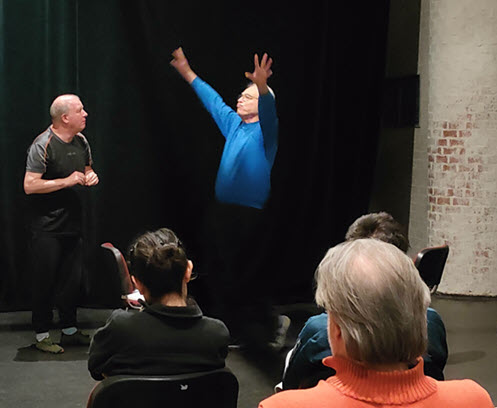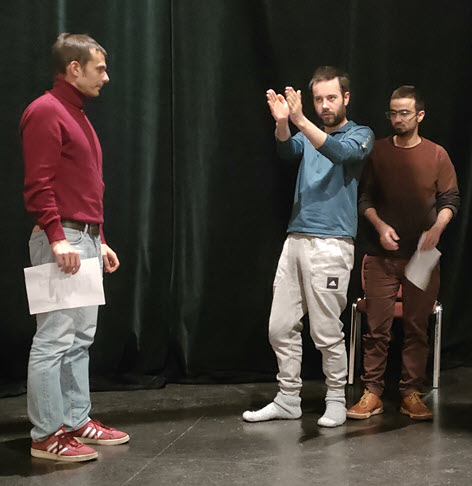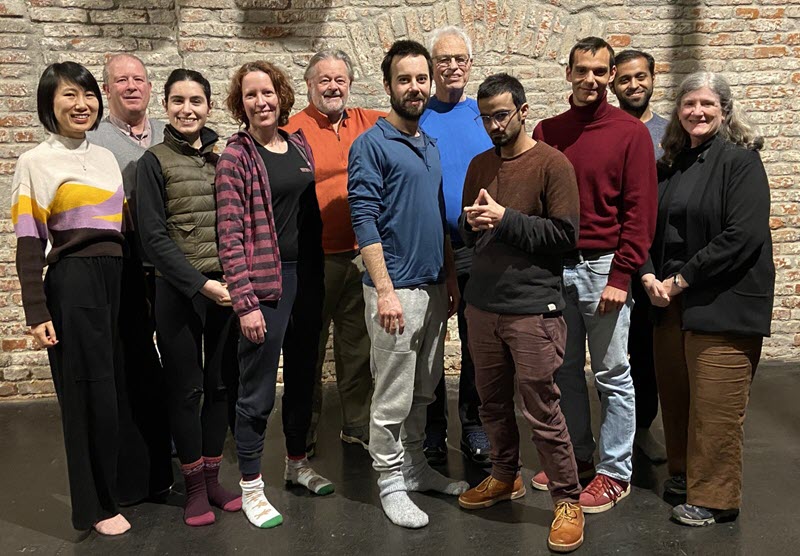Bogdan Tabacaru, a very talented stage director, recently led a Meisner[i] focused workshop that explored different tools to enable us to connect our real life experiences to the imaginary circumstances of the characters in a script through careful attention and deep listening.
We spent much of the morning doing different exercises to get acquainted with each other, to stretch and relax our bodies, and to help us discover for ourselves the extent to which our thoughts and expectations actually get in the way of real listening and attention.
We stood in a circle and took turns taking a step forward, saying our name in whatever tone and manner we chose, and accompanying it with any gesture of our choice – and then everyone else would mimic the voice and gesture at the same time. Such a simple instruction, yet I noticed how often I would not precisely repeat the name and gesture exactly as the other participant had done it. Still, it was the start of trust building in the group.
After the introductions it was time to warm up with dancing. Bogdan played some lively music from his phone and we each took turns stepping into the middle of the circle and dancing in whatever way we choose. The instruction was that everyone else should observe carefully, pick out the essence of the dancer and express it in their own dance. I watched some doing wild street dancing, others moving with beautiful fluidity, and still others (like me) just trying to keep moving without any clear idea at all of what they were doing. It was a task of observing and connecting but without judgement or self-evaluation.
I was especially touched by another of the trust exercises. Bogdan asked us to close our eyes, hold our hands loosely in front of us, and begin to walk slowly around in the room. I would bump into somebody, then simply turn in a slightly different direction and continue on. Bogdan would speak softly as he walked around the periphery of the room and gently help redirect anybody that got too far away or was in danger of walking into a wall or chair. I relaxed into a sense of trust that all would be well. The shift in my perception of my surroundings without vision was amazing.
After awhile, Bogdan told us to acknowledge the next person we bumped into by holding hands and experiencing the connection to them through touch, breath and the feel of their hands and skin. Then, after a few moments, Bogdan told us to whisper a “secret” into our partner’s ear (for example, “When I am sad, I …”), listen to their “secret”, then to let go and resume moving slowly around the room.
I was astonished at the sense of loneliness and loss that I experienced as I released the hands of my first partner and moved on. Yet knowing that that person was still somewhere in the room made it feel safer than before. After the third meeting in this way, Bogdan told us to open our eyes and acknowledge that person as our partner for the rest of the day.
We did some simple improv exercises in pairs. Two of us would go to the “stage” and the remaining participants would suggest two different imaginary characters, a location where the scene would take place, and the activity the characters were engaged in. Bogdan then told us to create the scene but restricted us to only four sentences, used in order:
- “What do you mean?”
- “I love you.”
- “You can’t be serious!”
- “I’m sorry.”
In the pictured scene, we were told that we were two priests in the church sanctuary preparing for the Sunday Mass. I’ll leave it to you to guess how the scene developed!

[Photo by Katrin Fegert]
Learning how to do improv well is a challenging endeavor, especially if your goal is comedic entertainment. Even though this was a simple exercise, I found myself struggling to let go of “my ideas” about how it should go, what would be “proper” and just really listen to my partner. It was only through this kind of collaboration with my partner that it was possible to create a believable scene that never existed before. Bogdan was very clear that this process was the heart of Meisner’s method for truly authentic acting – for bringing imaginary circumstances to life.
Next Bogdan took away the fixed script lines but told one of the participants a “secret” that would have to be revealed in some way in the improv scene. This introduced a different level of listening – one that involved not only listening to the words but also to all the intonation and non-verbal elements from my partner in order to reveal the secret. There was no way to “figure it out”. You had to really be present and respond authentically to whatever showed up.
Bogdan then moved us on to working with selected scenes from a script. Now I discovered that my focus on saying the lines accurately turned out to be a huge impediment to authentically listening to and interacting with my scene partner. What a conundrum!
Bogdan demonstrated an uncanny ability to see where each of us struggled to merge listening to our partner with authentically interacting with other imaginary people and things. In the pictured scene, the actor was talking to his partner while staring at an attractive body part of a woman standing at the bar. Bogdan asked another workshop participant to stand at the imaginary bar and coached the actor in conveying an imagined authentic interest.
In another scene, a woman is trying to deal with the unwanted interest of a man who had been watching her during her workout at the gym. She was trying at first to be polite as she packed up her things, then became more sarcastic when he “didn’t get the message.” Katrin struggled a bit to pack her things in an imaginary backpack at first, so Bogdan just put a bag on the floor and asked her to actually put some things into it while saying her lines.
The difference in the authenticity of their performances as they repeated their scenes using these new insights was both staggering and inspiring.
It was an amazing and satisfying day. I am so looking forward to our next workshop.
[Blog Photo by Peter Heinz]

[Photo by Katrin Fegert]

[Photo by Susan Voight]
[i] Sanford Meisner’s basic message is that the actor must really listen to and observe everything their fellow actor is saying and doing on the stage and then respond without judgement or intellectualization. You can read more about Meisner’s technique in my earlier post here.


A great day, very well spent. I learn so much in these classes.
A day spent exploring, full of wonderful surprises and camaraderie.
What a great class that must be and I know you are loving it.